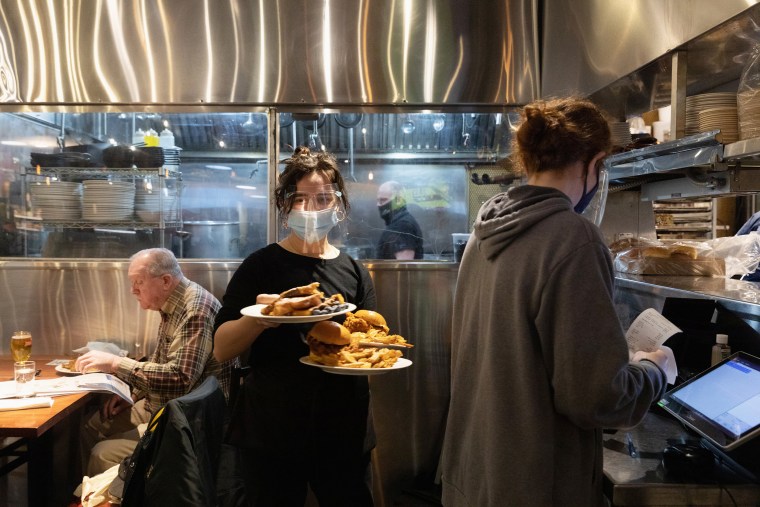States are rolling back Covid-19 restrictions as new cases trend down from record highs across the country. But experts warn it might be too much too soon as variants pose an increased risk and the pandemic — almost at the one year mark in the U.S. — is far from over.
In Iowa, Gov. Kim Reynolds, a Republican, lifted the state’s partial mask mandate on Friday. She also said businesses no longer have to limit the number of customers or enforce social distancing, and no limits remain on the size of public gatherings. The Des Moines Register's editorial board called the move “inexplicable and irresponsible.”
Reynolds isn’t acting alone. Democratic and Republican governors alike have been loosening restrictions. In New York, Gov. Andrew Cuomo, a Democrat, announced Monday that New York City will allow indoor dining beginning on Friday, a few days earlier than originally planned, and middle schools will reopen for in-person instruction on Feb 25. In Massachusetts, Gov. Charlie Baker, a Republican, said restaurants are allowed to operate at 40 percent capacity as of Monday, citing a decline in hospitalizations as part of his reasoning.
The moves to eliminate virus-related restrictions come as the most-recent seven-day average for new cases in the U.S. is 119,509 for the past week, according to an NBC News analysis. The last time that figure was that low was Nov. 9, near the beginning of the latest surge. The current new case numbers still far surpass the spring and summer highs.
“I have some concern it’s premature” to loosen restrictions, said Dr. Justin Lessler, an infectious disease epidemiologist at the Johns Hopkins Bloomberg School of Public Health.
Lessler said the very restrictions in place are what is allowing Covid-19 infection rates to decline.
“When we remove interventions, we frequently see resurgences,” he said, advising caution if states want to see continued decline. “When new variants come along, the stepping back that may have been OK before is not OK anymore because of the more transmissible variants.”
The CDC has reported fewer than 700 cases of the various strains of Covid-19 that have entered the country after first being identified in the U.K., South Africa and Brazil. Lessler said that number is “very much the tip of the iceberg” and hardly portrays the scope of their spread.
“The variants are here and circulating,” said Dr. Jennifer Lighter, a pediatric infectious disease specialist at NYU Langone Health in New York.
While much remains unknown about how the variants will spread and affect the U.S., their presence is undeniable.
Lighter said the U.S. isn’t doing enough “surveillance protecting” or sequencing to test how many of the recent positive cases are coming from the new strains. Still, she said, the surge that some anticipated from more transmissible variants has yet to materialize.
Reversing a mask mandate, she said, makes no sense, but moves like Los Angeles County’s to reopen outdoor dining at the end of January are sensible when being outdoors decreases the risk associated with contracting the virus.
To stay ahead of the variants, Dr. Anthony Fauci said Monday that it is crucial that people get both doses of the vaccine.
The boost from the second dose gives a "greater breadth of response," said Fauci, the head of the National Institute of Allergy and Infectious Diseases, meaning it can protect against the "wild type" of coronavirus circulating, including the variants.

